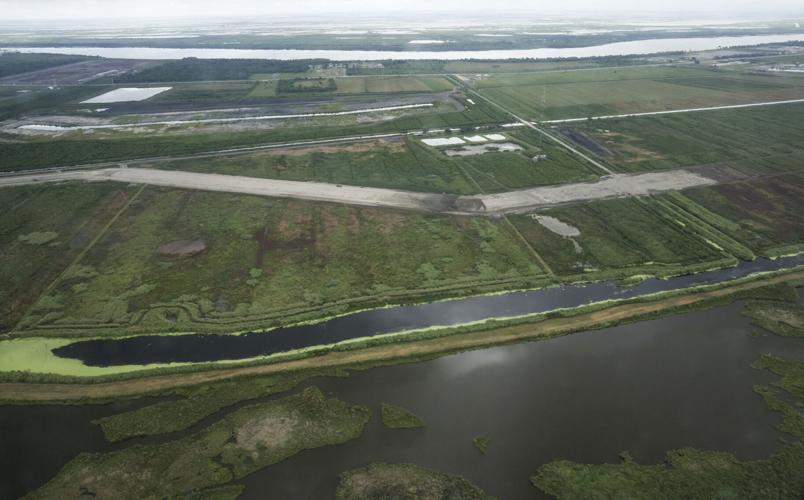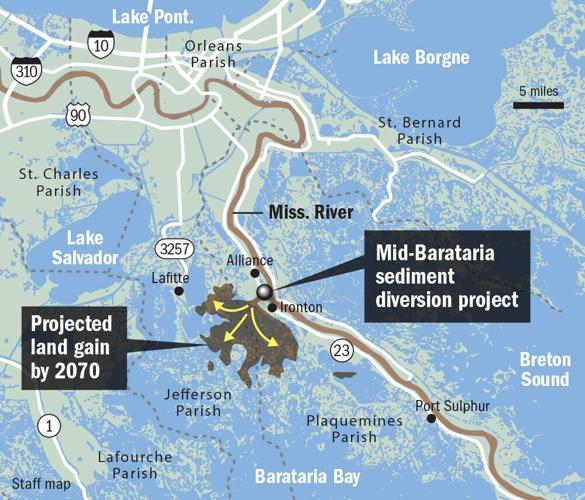Gov. Jeff Landry's administration has ordered a 90-day pause on work on Louisiana's biggest-ever coastal project, the controversial Mid-Barataria Sediment Diversion, arguing the state cannot afford the more than $3 billion plan and stressing that it must be smaller in scale.
The decision, confirmed by the state's coastal officials, took effect Friday. It halts nearly all work related to the project, which has been planned and studied for years and broke ground in August 2023 on the west bank of Plaquemines Parish near Ironton. Funds related to the 2010 BP oil spill are intended to pay for it, but state coastal officials say rising costs mean Louisiana could be on the hook for hundreds of millions of dollars, if not more.
While not officially killing the project, the pause moves what many once considered the linchpin of the state's coastal restoration plans further out of reach. Only initial work had been allowed to continue in recent months at the site as the state negotiated with Plaquemines Parish over its future.
State coastal officials say they are now developing ideas for a smaller diversion and want to move forward with construction of a large-scale land bridge in Barataria Basin using dredged sediment to build it.
Prominent coastal advocacy groups expressed dismay over the move and urged the state to reconsider. They note that marsh-building projects using dredged sediment eventually erode just like the rest of the coast, whereas the Mid-Barataria project mimics the way south Louisiana was built in the first place.
But state officials say a decision had to be made.
"This thing is just costing us a fortune right now, so we have to quickly suspend it for 90 days, and that way we at least stop the bleeding," said Gordon Dove, chairman of the board overseeing the state's Coastal Protection and Restoration Authority.

Map of the Mid-Barataria sediment diversion project.
Tony Alford, who chairs the governor's advisory commission on coastal affairs, offered similar comments. The CPRA issued a statement saying a small amount of work would continue, including relocation of a pipeline in the area and site maintenance.
Dove said he hopes to announce a new strategy to move forward with in a month or two, but stressed that the state intends to push ahead with planning for other projects in the meantime, including the land bridge that would stretch more than 20 miles. Coastal advocates say the Mid-Barataria diversion was meant to nourish that land bridge with sediment, but Dove maintains there are other options.
'Dangerously misguided'
A smaller diversion would cause far less harm to commercial shrimping and oyster growing in the area, one of the main criticisms of the Mid-Barataria project. Under the previous plan, shrimpers and oyster growers in the diversion area would have to move farther out or find another line of work. Nearly $380 million had been set aside to help those affected by the project, including commercial fishers and buyouts for homeowners.
Dove says the $380 million will not be nearly enough compensation and is worried about the prospects of lawsuits. Contractors could, however, also sue over the lost work if the project is canceled, and it is unclear whether the roughly $500 million already spent can be recouped.
The diversion project would funnel up to 75,000 cubic feet per second of water and sediment from the Mississippi River into the Barataria Basin to rebuild lost wetlands. It was projected to build 21 square miles of land over 50 years and was issued a permit for construction by the Army Corps of Engineers after an exhaustive environmental study.
Coastal advocates say it matches the scale of Louisiana's land-loss crisis, with the state having lost some 2,000 square miles over the last century. Sea level rise is projected to worsen the problem in the decades ahead.
"Efforts to delay this project are dangerously misguided, squandering valuable time and jeopardizing hundreds of millions already invested in our coast, all while disregarding the robust science underpinning our Coastal Master Plan," said Simone Maloz, campaign director of the Restore the Mississippi River Delta coalition, referring to the state's 50-year blueprint for salvaging as much of the coast as possible.
"In a place losing land faster than almost anywhere else on the planet, we have no time to lose putting our communities and culture at further risk. There is simply no alternative that provides a greater chance of survival for the people, wildlife and economy of Louisiana."
Kim Reyher, executive director of the Coalition to Restore Coastal Louisiana, said the organization was "disappointed by this development, but the river can still do what it’s always done: build and sustain land and life in our wetlands."
"We call on our leaders to focus on acting with urgency and using Deepwater Horizon settlement funds for projects vetted through our Master Plan," she said.
'It's falling apart'
Alford said a diversion around a third of the size of Mid-Barataria, or possibly less, was among the options being studied. He and Dove said that while they respect the positions of those favoring the diversion, they simply cannot see a way forward.
They also argued that marsh-building with dredged sediment could build land faster without harming commercial fishing. They said they are not abandoning the state's master plan, pointing out the land bridge is included in it.
Landry made similar comments when he spoke before a legislative committee in November, saying the project would "break our culture."
Beyond those concerns, Alford argued that "you just can't afford it."
"You look at the coast and how much of the land is falling apart as we go forward, and it's falling apart a lot faster than replenishing or getting that kind of result in 50 years," he said of Mid-Barataria's projected land-building.
Some $2.92 billion in BP funding has been approved for the project, but Landry has said the cost has now risen to at least $3.1 billion.
The National Oceanic and Atmospheric Administration, a key member of the trustees group overseeing the BP funds, says the contract includes a maximum guaranteed price and that contingency funding is in place for cost increases. But NOAA notes that cost increases because of delays caused by the state are not covered under the maximum guaranteed price.
Landry shifted the state's position on the project after taking office in 2024. He abandoned the state's previous legal position that it did not need a permit from Plaquemines Parish, which firmly opposes the project and has filed suit to stop it.
An agreement with the parish had allowed limited work to move forward. Work done includes site clearing, utility relocations, drainage improvements and access dredging. The 90-day pause will now see equipment moved off the site, which Dove says will save money.
Using the BP funds for a different project would likely trigger the need for approvals and scientific analysis that may take several years.





